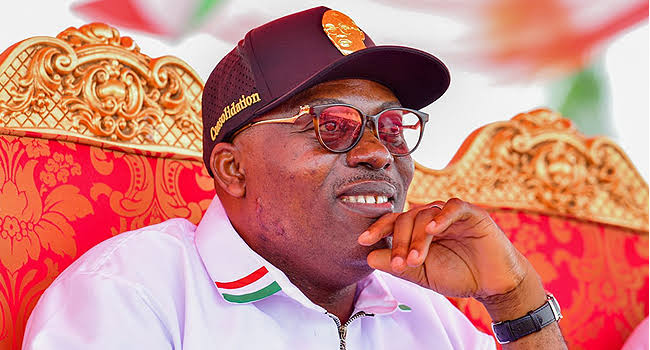On a day of national reflection and celebration, Rivers State Governor Siminalayi Fubara delivered a powerful address marking Nigeria’s 64th Independence Day. Speaking from the state capital of Port Harcourt on October 1, 2024, Fubara reaffirmed his commitment to the state’s progress while subtly addressing ongoing political tensions with former governor and current FCT Minister, Nyesom Wike.
Governor Fubara, dressed in traditional attire reflecting the solemnity of the occasion, stood before a crowd of state officials and citizens at the Liberation Stadium. His voice carried clearly through the warm coastal air as he declared, “Our administration will not surrender to barefaced blackmail.
This statement, while not naming specific individuals, was widely interpreted as a reference to recent political friction between Fubara and his predecessor, Nyesom Wike. The governor’s words resonated with many in attendance, who nodded in agreement, reflecting the complex political landscape of Rivers State.
Despite the underlying tensions, Governor Fubara’s speech primarily focused on his vision for Rivers State’s future. He outlined several key areas of focus:
- Ensuring peace and security across the state
- Advancing good governance initiatives
- Delivering critical infrastructure projects
- Sustaining and increasing the state’s Internally Generated Revenue (IGR)
We are committed to building on the foundations laid by previous administrations,” Fubara stated, “while charting new paths for growth and development that will benefit all Rivers people.
As the Nigerian flag waved gently in the background, Governor Fubara took a moment to reflect on the nation’s history. He recalled the iconic moment on October 1, 1960, when Sir Abubakar Tafawa Balewa, Nigeria’s first Prime Minister, raised the green-white-green flag, symbolizing independence from British colonial rule.
“The vision of our founding fathers at independence was to build a united and secure nation,” Fubara reminded the audience, “anchored on the values of brotherhood, democracy, justice, and the equality of all peoples, tribes and nations.”
This historical perspective provided context for the current challenges facing both Rivers State and Nigeria as a whole. The governor acknowledged the efforts of past and present leaders in keeping the country united and working towards progress.
Governor Fubara did not shy away from addressing the difficulties facing Nigeria after 64 years of self-rule. Our nation still totters amid diverse challenges, including widespread human insecurity,” he admitted. The crowd grew solemn as he spoke, many nodding in recognition of the daily struggles many Nigerians face.
However, the governor was quick to pivot towards reasons for optimism. Despite the economic hardship and social ills bedevilling our nation and stifling its progress, we still have good reasons to celebrate and be grateful to God as a nation and people,” Fubara asserted.
He went on to highlight Nigeria’s positive attributes:
- A reputation for hardworking, confident, and happy people
- Abundant natural and human resources
- Significant economic potential
- Rich cultural diversity
“We are a vibrant nation where different religions, languages, and traditions co-exist peacefully,” Fubara emphasized, his words met with applause from the diverse crowd gathered before him.
As the governor’s speech concluded, local political analysts were quick to weigh in on its implications. Dr. Amina Okoye, a political science professor at the University of Port Harcourt, noted, “Governor Fubara’s address skillfully balanced national pride with acknowledgment of local challenges. His subtle reference to political pressures suggests ongoing tensions within the state’s power structures.
Meanwhile, supporters of both Fubara and Wike could be seen in small groups around the stadium, their discussions animated as they debated the speech’s meaning. One Fubara supporter, who wished to remain anonymous, stated, “The governor is right to stand his ground. We elected him to lead, not to be a puppet.”
On the other hand, a Wike loyalist argued, “Cooperation is key for our state’s progress. We shouldn’t interpret every statement as a political attack.”
As the Independence Day celebrations continued into the evening, with fireworks lighting up the Port Harcourt sky, the implications of Governor Fubara’s speech lingered in the minds of many. His commitment to progress, coupled with a clear stance against political pressure, sets the stage for an intriguing period in Rivers State politics.
The governor’s focus on increasing Internally Generated Revenue and delivering critical projects suggests a pragmatic approach to governance. However, the success of these initiatives may well depend on how effectively he can navigate the complex political waters of the state.
As Nigeria marks another year of independence, Governor Fubara’s address serves as a microcosm of the nation’s broader narrative. It highlights the ongoing struggle to balance regional interests with national unity, and the challenge of making progress in the face of both internal and external pressures.
The governor’s message of resilience and hope, set against the backdrop of acknowledged challenges, reflects the spirit of Nigeria itself – a nation that continues to strive for progress, even in the face of adversity. As Rivers State moves forward under Fubara’s leadership, all eyes will be on how this delicate balance is maintained, and whether the promise of progress can be translated into tangible improvements for the people of Rivers State and Nigeria as a whole.



